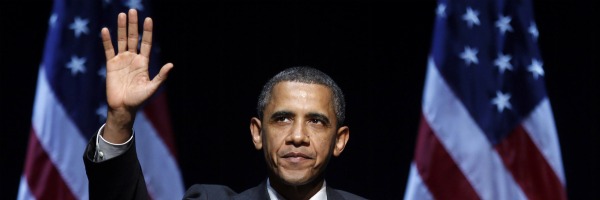Did Obama's Failure to Stand Up to Wall Street Doom the Recovery?
The president couldn't jump-start job creation. He's also perceived as not standing up against "moneyed interests" on Wall Street. But one has little to do with the other.

Columnists occasionally suffer from a bias against the obvious. For writers with lots of space and an expectation to surprise their audience, there arises a natural prejudice against simple explanations.
It is simple to say that unemployment is high today because we suffered a catastrophic financial collapse. It is simple to say that Wall Street profits are high today because financial firms, having been bailed out by Washington, understand how to mint money in a global economy with ferocious foreign growth. It is less simple, and also quite surprising, to argue that 9 percent unemployment is the stepchild of Wall Street's enduring power.
Thus, this: "Obama's Original Sin" is the first column by Frank Rich for his new employer, the redoubtable New York magazine, four months since his left his plum gig on the New York Times Sunday op-ed page. In the sub-header of the article, or what journalists would call the dek, it's clear that Rich's gunpowder has spent the last 100 days generating kinetic heat, because the top-line accusation is explosive: "The president's failure to demand a reckoning from the moneyed interests who brought the economy down has cursed his first term, and could prevent a second."
Later Frank settles on a thesis: "[Obama's] failure to push back against the financial sector, sparing it any responsibility for the economy it tanked, empowered it to roll over his agenda with its own. He has come across as favoring the financial elite over the stranded middle class even if, in his heart of hearts, he does not. There are at least three reasons to question the idea that Obama's failure to rein in Wall Street, punish Wall Street, and fine Wall Street, is what's fundamentally hurting Main Street.
First, there is little evidence that money on Wall Street hurts job creation. In fact, there is every reason to believe that the correlation, whatever its strength, goes the opposite way. When banks have more money, they have more money to lend, and companies have more money to spend. Wall Street was fabulously profitable in the 2000s when unemployment was below 5%. Then financial firms saw profits plunge in 2008, and the economy went into a tailspin. Job losses accelerated into January 2009. By July that year, financial profits had stabilized and six months later, unemployment hit a plateau. The unjust reality of things is that when Wall Street falls, the economy falls; but when Wall Street picks itself up, the workforce doesn't necessarily follow.
Second, the net effect of Wall Street regulation in the near term is probably fewer jobs on Wall Street. From January through May, the financial sector cut 11,413 jobs, up 21% from the year before, according to outplacement company Challenger, Gray & Christmas, Inc. New regulation may be causing many of the layoffs, Dan Indiviglio wrote. New rules on compensation are increasing the cost of labor. Rules to shrink bonuses force banks to raise salaries. "I spoke with a banker last night whose firm is naming this reason for its recent layoffs," Indiviglio wrote. Maybe he was blaming Washington for his own firm's mistakes. But there's no question that regulation could result in fewer jobs at the margin -- or in the future.
Third, the purpose of financial reform is to lower the risk of catastrophic financial collapse in the future. That's not stimulus, it's insurance. Bad insurance isn't bad stimulus. In fact, it might be the opposite.
"Financial reform is supposed to limit the formation of bubbles, but the formation of bubbles is actually very good for short term job growth," says Ted Gayer, co-director of the Economic Studies program at the Brookings Institution. "There's really no direct tie between strong financial regulation and job creation today."
A more politically sophisticated argument would have gone something like this. In early 2009, President Obama passed the $800 billion stimulus and promised it would keep unemployment below 8%. He was wrong. The fact that he was wrong hurt the political salience of stimulus. Fiscal conservatives rushed to power, which they consolidated in the 2010 election. Today, bipartisan stimulus fever is about as likely to break out in Washington as tap dancing. Meanwhile, unemployment languishes. Americans don't care about corporate profits qua corporate profits. They care that somebody is having it good while they've got it bad. And the president -- due to both economic and political realities -- can't make it better.
Frank Rich is a wonderful writer -- colorful, telescopic, and insightful. But this is a classic case of a bias against the obvious. Money rules Washington, and Wall Street has lots of it, and Congress will not soon pass a law that would fundamentally de-claw the financial system. This might or might not turn out to be a tragedy someday, but it is not the tragedy right now. Unemployment suffers today not because of, but independent of, Wall Street's success. That is the simple, boring truth.